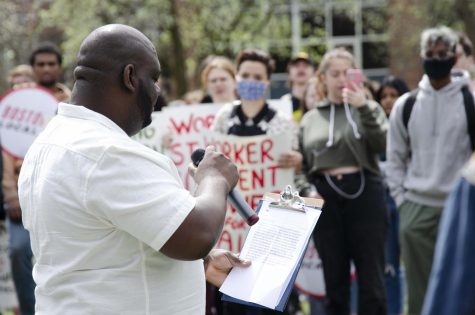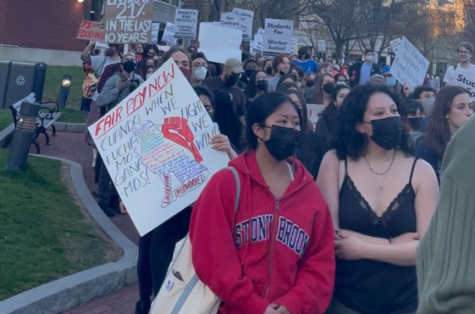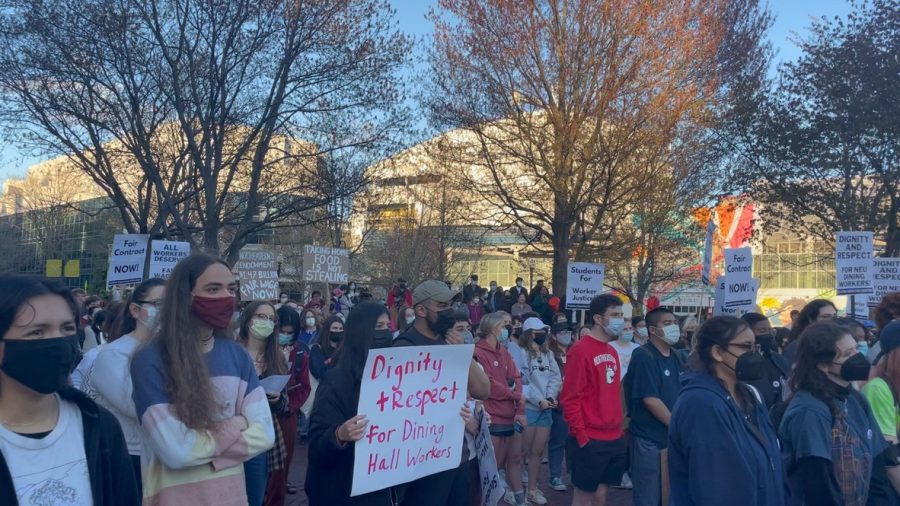Students, dining hall workers stand in solidarity, call for better working conditions
May 11, 2022
Students came together with dining hall workers and the UNITE HERE Local 26 union April 22 to march for contracts that provide livable wages, affordable healthcare and improved working conditions.
Northeastern students and dining hall workers have recently reformed the HOWL coalition to advocate for a new contract that provides better working conditions and benefits for the dining staff. As the staff and their union begin working towards this new contract, which will be negotiated by Aug. 31, hundreds in the Northeastern community have shown up to recent protests on campus in solidarity with the employees.
The protests have been led and organized by the Huskies Organizing with Labor, or HOWL, Coalition, which is composed of students, dining hall workers and their union, UNITE HERE LOCAL 26, to call for changes in contract negotiations with Chartwells, the company contracted by Northeastern for its food services. HOWL is currently calling for liveable wages, better working conditions and affordable healthcare for dining hall workers.
Creation of HOWL 2022 to offer aid in contract negotiations
HOWL originally began in 2012 to help dining hall workers form a union under UNITE HERE Local 26, and resurfaced in 2017 to demand $35,000 a year for full-time workers and affordable health care. Both of the HOWL campaigns resulted in favorable contract negotiations.
HOWL reignited again in January 2022 to help advocate for a better contract for food service workers. With the economic hardships of the pandemic, inflation and rising living costs due to gentrification, many dining hall workers have found themselves struggling to feed their families and meet basic needs, HOWL said in their resource guides. The group is calling for many changes in the contract negotiations including increasing wages to be comparable to Harvard and Massachusetts Institute of Technology, or MIT, who pay their workers $5-6 more per hour; setting a full-time schedule of 40 hours per week and allowing dining hall workers to bring excess food home for their families.
After hearing dining workers speak about their experiences at a joint meeting between Northeastern’s Young Democratic Socialists of America, or YDSA, and Northeastern Mutual Aid in January, second-year history, culture, and law major Alex Madaras said she knew that something must be done to further advocate for dining hall workers.
“The minute I listened to the worker stories, the minute that we met them and we heard from them in their own words, it just changed my plans. It just felt so urgent and close to home. What was happening really shifted my perspective about labor issues on campus,” Madaras said. “I know from experience how important dining hall workers are to our experiences as students. For me, I feel a sense of responsibility and solidarity. … It’s unfair for us to depend so much on [the dining hall workers’] hard work to make the university run and then not pay attention to the struggles, not try to support them in their fight. It feels important to be connected to the people you are in a community with.”
Madaras recalled that there were a lot of exciting conversations at the January YDSA meeting about getting students and organizations on board. Shortly after the meeting, a HOWL resource guide, including a presentation, one-page fact sheet and link to sign up to join HOWL, was distributed to organizations and classes to encourage involvement through its outreach team. As of May 11, 65 organizations have signed on to participate in HOWL, Madaras said.
Dining workers share struggles, hopes for new contract at rally
Madaras, along with several other HOWL members, organized a rally April 16 at 11 a.m. at Centennial Common. Several dining hall workers, student activists and community members spoke at the rally.

“It’s very hard to live in Boston with my paycheck. Everything is going up: rent, food, gas. I have to work two jobs right now so that I can take care of my family. A lot of my co-workers live outside of Boston because they can’t afford to live in the city,” said Beludchy Pierre Louis, a cook at Stetson Hall for seven years, at the rally. “We are fighting for a higher wage, better health insurance and more sick time.”
Another speaker at the rally included City Councilor-at-Large Ruthzee Louijeune, whose father has worked at the dining halls at Northeastern for the last 20 years.
“This is a personal cause here. I look at Beludchy, we heard from Jay, I see Jean-Claude … I see so many people who I’ve known my entire life who deserve a living wage, a job with dignity, to have breaks…” Louijeune said at the rally. “We are in unprecedented times right now. Our families are dealing with inflation and rising costs of housing. They are being pushed out. We need to make sure we are putting people before profit. We need to make sure our residents who are holding up the universities, that we let them know they are essential in their paychecks.”
Sofia Perez, a graduate student studying journalism and a HOWL organizer, explained at the rally that each dining hall worker they talked to spoke about their inability to afford to live in the Boston area due to extremely high rents, which are forcing many dining workers to move out of the city and creating increased transportation costs.
Boston’s rental market has reached all-time high prices — the median monthly rent for a one-bedroom apartment is around $2,720, according to the Boston Globe. This is a $500 increase from the median cost in 2017, which was $2,270, but the dining hall workers’ base wages have not increased in that time, since their current wages were set by the 2017 contract.
“I take the bus and the T to go to work. I work only five hours a day, but it takes me almost three hours to get to work and back. I’m fighting for a full-time schedule of eight hours of work a day,” said XiuQiong He, a dining hall worker who has worked in International Village for seven years, at the rally. “I think we should get a discount on transportation because the monthly T pass is $90.”
As the workers at the rally shared the struggles they have faced due to low wages and limited benefits, the sounds of chants including, “When we fight, we win!” and “¡Escucha, estamos en la lucha!” which translates to “Listen, we are in the struggle!” spread throughout Centennial. Solidarity remained in the air around campus as HOWL prepared for the march the next Friday.
Students, community members march with dining workers to demand better working conditions
Members of HOWL organized a march the following week to drive home their goals for the new contract. Students, dining workers and community members flooded Centennial Common at 6 p.m. on April 22 and prepared to march to Krentzman Quad to call for action.
Speakers at the start of the march, many of whom were dining hall workers, spoke to the crowd gathered in Centennial Common. Ronulfo Piña, a cook at Sweet Tomatoes in Curry Student Center, shared his struggle with facing food insecurity due to low wages.
“Every night when I come home, it is difficult for me to know how to provide food for my own family. I live with my wife and three children, who are 20, 18 and 14 years old,” Piña said. “I help my two oldest with their tuition. My wife is retired and only has Social Security. At Northeastern, my wages are not enough.”
Piña also said dining hall workers are not allowed to bring home any excess food at the end of the day because management considers it stealing. HOWL argues that this must change, as it contributes to food waste while also leaving families of dining hall workers food insecure.
Another dining hall worker, Shu Ling Liang, who has worked at Stetson Hall for 18 years, discussed the difficult position her expensive health care plan and her low wages put her in. She said she has to decide between taking care of her and her family’s health and making sure there’s food on her family’s plate.
“After so many years I have severe leg pain that affects me every single day. I have difficulty walking. But I am afraid to go to the doctor to get the treatment I need,” Liang said. “My husband, who is sick with thyroid problems, cannot afford to see the specialist he needs. The health insurance from my job at Northeastern has very high co-pays and deductibles. This job does not give me what I need to take care of my leg … I don’t want this for my life anymore. I don’t want to choose between my health and food for my family.”
Thomas Gross, a grill cook at International Village, has been heavily involved with organizing for HOWL and shared his experience with rising rent, which compromised his family home and is harming his community.
“I am born and raised in Roxbury for 40 years. Over the years, I’ve seen my neighborhood change a lot. Rents gone up, bills have gone up, neighbors have had to move out. It really changes the community,” Gross said at Centennial before the march officially began. “You don’t get to see the same faces anymore that you grew up with. All of the people who know each other and love each other after so many years living together. That’s not right to me.”
Gross also said his childhood home, the one he grew up in and continued to live in throughout his life, was taken by the bank since his salary, even combined with his mother’s, aunt’s and uncle’s, was not enough to save his home.
“We couldn’t find a way to save our house from the bank. I was hurt, depressed and scared, not being sure where to move to. It’s hard for me to tell my story, but I decided to tell it today because it is a story of so many co-workers at Northeastern,” Gross said. “I’m here today because it’s time to push back. It’s time to say ‘no’ to the low wages that the workers at the Northeastern dining halls are paid. It’s time to say ‘no’ to what Northeastern is doing to Roxbury with families being forced out.”

After the speakers finished, the march officially began and, cheers such as “What do we want? A fair contract! When do we want it? Now!” among many others, echoed across campus as hundreds marched to Krentzman Quad, ready to continue putting pressure on the Northeastern administration for change.
In an email statement to The News, Northeastern spokesperson Shannon Nargi said the unionized dining staff are employees of Chartwells, a food service vendor, and not of Northeastern. As such, Northeastern is not involved in the contract negotiations.
“The staffing levels and shifts are subject to the contract negotiated by their union (Unite/HERE, Local 26) and Chartwells several years ago. Any changes would be for Chartwells and the union to determine consistent with their contract,” Nargi wrote.
Dee Sethi, a first-year criminal justice and cybersecurity combined major and an organizer for HOWL, said she thinks the administration fails to provide a safe and respectful working environment for dining staff workers.
“During this organizing, I’ve learned that Northeastern as an administration doesn’t really care about its workers and that it’s up to students to make sure that we’re there with them standing in solidarity and fighting,” Sethi said.
Vishakha Tiwari, a first-year politics, philosophy, and economics major urges the importance of supporting dining hall workers as they are an essential part of the Northeastern community.
“It’s really easy to distance yourself from what’s going on in your community. To say ‘This isn’t affecting me’ or ‘I’m not a part of that group.’ Northeastern succeeds in not paying fair wages or treating people fairly when we have that mindset as students,” Tiwari said. “It’s your community… this is your tuition that is not going to the people who deserve it. You have the power to do something about it.”
HOWL organizers are leading several grassroots mobilization training workshops, media training workshops and outreach initiatives to further inform the community about the movement. Sethi also said others can get involved in the coalition by filling out the form in the group’s Instagram bio, which allows people to sign up to join their Slack and become more involved in HOWL, which will also be doing work in the summer.
Katelyn Buckley, a second-year environmental studies and political science combined major and member of HOWL’s outreach team, said she found it surprising how little people know about what is going on at Northeastern.
“When your dorm storming or when you’re talking to students handing out flyers, people all rely on the dining halls and they all feel that it’s important to go to the dining halls, you know, for food, etc., [but] they have no idea a lot of the time what’s going on,” Buckley said. “ I think a lot of that is intentional by the university, as many things are hidden by Northeastern. Northeastern as the school can’t function without its students or workers. Without us both, it would cease to exist. So if we work together, I think we can do something amazing.”

